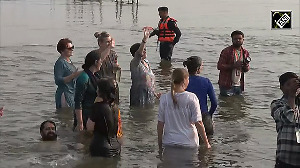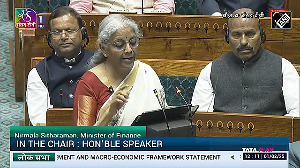Korean steel giant Posco is taking a novel route to persuade land-owners to sell their land in Orissa's Jagatsinghpur district where its Rs 52,000 crore (Rs 520 billion), 12 million tonne steel plant is to be located.
Apart from monetary compensation for the land, Posco is offering the 140-odd fisher families that will be displaced by India's largest greenfield steel plant an assured market for dried fish and mango pickle in South Korea.
The company, which has been facing stiff resistance from locals who will lose land to the project, proposes to train fishermen in the area to produce the dried fish coveted by Koreans, according to a Posco India spokesman.
"Around 160 families in the periphery have shown interest and will be included in the programme," he said. He said some 160 families on the periphery of the project had accepted the proposal.
A similar programme is being planned for betel vine cultivators. "They have shown interest in fruit, especially mangoes. We will get pickle manufacturers to collaborate with them and export these products to South Korea," he added.
A socio economic survey, which is still being conducted, indicates that there are around 50 betel vine owners and 1,000 cultivators for 1,200 betel vines. "Not just the owners, the cultivators will also be included in the programme," he said.
The plan has been suggested as a solution to the vexed problem of compensating land-losers by offering them sustainable livelihood. At the same time, it will meet a growing demand for dried fish and pickle in Korea. According to reports, Korea's imports are expected to exceed exports due to depletion of fish resources. Its pickle demand is primarily met by China.
Posco plans to develop a captive port at the mouth of the Jatadhari river, 10 km from the port town of Paradip, to secure consistent and timely supplies of raw materials and products.
"The products developed by the fishermen and betel vine cultivators will be exported to Korea through Posco's captive port. After meeting the demand in the Korean market, they can be exported to South East Asia," the spokesman said.
Posco India is currently in the last leg of its land-acquisition programme. Of the required land of 4,004 acres, the Orissa government is to provide 3,566 acres (of which it is yet to get possession). The company will have to buy the remaining 438 acres of land directly from land-owners.
The rehabilitation & periphery development advisory committee (RPDAC) is expected to meet shortly to decide on the compensation package. The committee comprises representatives from the government, the company and the local people.
The private land covers three gram panchayats -- Gada Kujanga, Muagaon and Dhinkia, the latter being the largest tract covering 200 acres and has been the most aggressive in leading an agitation against Posco's steel plant.
However, the Posco spokesman said, things have improved and the survey indicated that around 90 per cent of the people wanted to shift to other means of livelihood.






 © 2025
© 2025